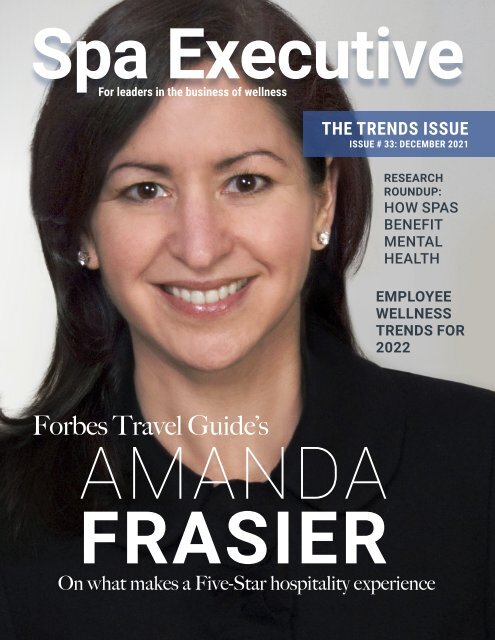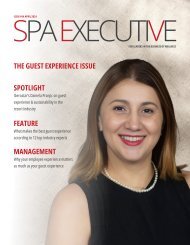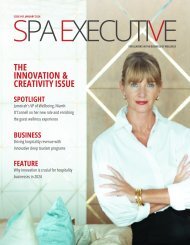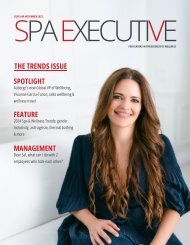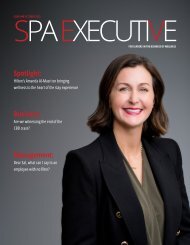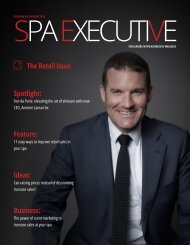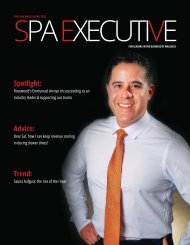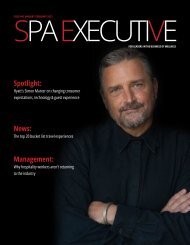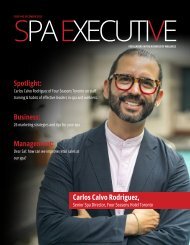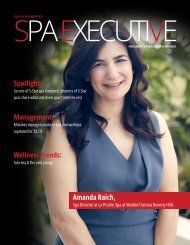Spa Executive - December 2021
Create successful ePaper yourself
Turn your PDF publications into a flip-book with our unique Google optimized e-Paper software.
<strong>Spa</strong> <strong>Executive</strong><br />
For leaders in the business of wellness<br />
THE TRENDS ISSUE<br />
ISSUE # 33: DECEMBER <strong>2021</strong><br />
RESEARCH<br />
ROUNDUP:<br />
HOW SPAS<br />
BENEFIT<br />
MENTAL<br />
HEALTH<br />
EMPLOYEE<br />
WELLNESS<br />
TRENDS FOR<br />
2022<br />
Forbes Travel Guide’s<br />
AMANDA<br />
FRASIER<br />
On what makes a Five-Star hospitality experience
ISSUE # 33:<br />
DECEMBER <strong>2021</strong><br />
4<br />
7<br />
14<br />
18<br />
23<br />
26<br />
31<br />
Employee wellness trends for 2022<br />
Seven wellness trends for 2022<br />
Research roundup:<br />
How spas benefit mental health<br />
Featured property:<br />
Four Seasons Hotel London at Park Lane<br />
<strong>Spa</strong> tech trends for 2022:<br />
Driving simplicity and sustainability<br />
Forbes Travel Guide’s Amanda Frasier on what<br />
makes a Five-Star hospitality experience<br />
<strong>Spa</strong> and wellness trends for 2022<br />
according to the experts<br />
<strong>December</strong> <strong>2021</strong> Issue • p. 2
Letter from Publisher<br />
Dear readers,<br />
The holidays are upon us and we’re coming to the end of the year. What a time it’s been.<br />
Recent months have brought struggle and challenges, and have also spurred advancement<br />
and innovation, brought out the best in creative business minds, and driven a surge of<br />
interest in wellness and self care.<br />
Closing out the final quarter of <strong>2021</strong> and heading into 2022, we’re taking the opportunity to<br />
explore trends and developments in this issue of <strong>Spa</strong> <strong>Executive</strong>.<br />
For our Spotlight interview we spoke with Forbes Travel Guide’s <strong>Executive</strong> Vice President<br />
of Standards & Ratings, Amanda Frasier, about what sets a Five-Star hospitality experience<br />
apart from the rest and what’s new for 2022.<br />
Frasier said, “Just before the pandemic hit, a big focus for us was launching sustainability<br />
standards, but we paused releasing them.”<br />
“We did release a set of sustainability standards for hotels in <strong>2021</strong>, and these will be made<br />
official in 2022, meaning they’ll be part of the scoring. We have also created a separate set<br />
of sustainability standards for spas and restaurants that will officially become part of the<br />
star award system in 2023.”<br />
Read the rest of the interview here: Forbes Travel Guide’s Amanda Frasier on what makes<br />
a Five-Star hospitality experience.<br />
Among other topics, we know that employee wellness will be top of mind as we work to<br />
overcome the hospitality staffing shortage, so, we spoke to Gallup’s Wellbeing Lead, Ryan<br />
Wolf about the employee wellness trends he’s expecting to see in 2022. We’ve gathered<br />
up some research on how spas benefit mental health, given the renewed focus on mental<br />
wellness we’re seeing these days. And, speaking of Five-Stars, we take a look at the Five-<br />
Star Four Seasons Hotel London at Park Lane and the Park Lane <strong>Spa</strong>, an escape where<br />
guests can renew themselves and leave feeling calm, balanced and refreshed.<br />
Finally, we’re giving you our own predictions for the wellness trends we’ll be paying close<br />
attention to in 2022, including sustainability, adaptogens, and catching up on women’s<br />
health, in our hospitality handbook, Seven wellness trends for 2022. We’ve also asked<br />
several industry experts to weigh in with their thoughts. You can read those in the handbook<br />
and also in this separate article: <strong>Spa</strong> and wellness trends for 2022 according to the experts.<br />
I hope you enjoy reading this month’s articles in <strong>Spa</strong> <strong>Executive</strong> and they provide valuable<br />
information to help you achieve success. And I wish you happy holidays and much joy and<br />
success in the coming year.<br />
About<br />
<strong>Spa</strong> <strong>Executive</strong>:<br />
<strong>Spa</strong> <strong>Executive</strong> is<br />
Book4Time’s magazine<br />
for leaders in the business<br />
of wellness. News, views,<br />
and interviews to help you<br />
attract top talent, increase<br />
customer retention, and<br />
offer the best possible<br />
guest experience.<br />
The <strong>Spa</strong><br />
<strong>Executive</strong><br />
Team<br />
Publisher<br />
Roger Sholanki<br />
Creative Director<br />
Emily Moxley<br />
Editor<br />
Elizabeth Bromstein<br />
Designer<br />
Andrea Fernández<br />
Hernández<br />
Roger Sholanki,<br />
CEO<br />
Book4Time
EMPLOYEE WELLNESS<br />
TRENDS FOR 2022<br />
Employee wellness and wellbeing should<br />
be top of mind right now for leaders in the<br />
hospitality industry. Nobody should be<br />
ignoring it or putting it off.<br />
Staffing was already an issue before the<br />
start of the COVID-19 pandemic in 2020 and,<br />
heading into 2022, hotels, resorts, and spas<br />
are facing an unprecedented worker shortage.<br />
As the hospitality industry works<br />
to fix the staffing crisis, employee<br />
wellness should be top of mind.<br />
Let’s look at some employee<br />
wellness trends for 2022.<br />
So, companies should be looking at any<br />
number of potential changes to their<br />
recruitment and retention strategies.<br />
<strong>December</strong> <strong>2021</strong> Issue • p. 4
People don’t want to work in hospitality<br />
We can’t gloss over it anymore; people don’t want<br />
to work in hospitality.<br />
According to Forbes, a recent survey of more than<br />
30,000 job seekers, from Joblist, found that 60%<br />
of job seekers would not consider working in a<br />
restaurant, bar, hotel or other hospitality job. Of<br />
those, 70% said nothing would convince them to<br />
work in hospitality. Plus, 38% of former hospitality<br />
workers said they are not even considering a<br />
hospitality job, and only 26% said higher pay would<br />
incentivize them to change their minds.<br />
Fortunately, this can change. As dire as things<br />
sound, it’s not an unsolvable problem. It will,<br />
however, take attention, time, and financial<br />
investment. Hurdles may be bigger in hospitality<br />
than other industries, thanks in part to the amount<br />
of person-to-person contact required in these<br />
industries, but they are not insurmountable. You<br />
only control what you can control, but that may be<br />
a lot more than you think.<br />
You can make employees feel valued<br />
Companies can increase pay and workplace<br />
flexibility. They can listen to their employees<br />
and pay attention to people’s needs. A focus on<br />
employee wellbeing is something everyone can<br />
offer. Making employees feel valued is another<br />
thing that everyone can offer.<br />
Studies show the primary reasons employees<br />
quit their jobs is when workplace health and<br />
sustainability expectations go unmet and they<br />
feel underappreciated and undervalued. And a<br />
2020 survey by Qualtrics found that travel and<br />
hospitality employees are the least likely out of all<br />
industries surveyed to feel valued at work.<br />
Focus on mental health<br />
In a recent SWNS poll of 2,000 Americans, 57%<br />
said they would willingly exchange supposed<br />
perks like “free in-office food” for free mental<br />
health resources, and six in 10 ranked health<br />
benefits as the most important non-salary-related<br />
factor when considering a job. Separate research<br />
found that healthcare, sick and parental leave,<br />
and flexible work schedules were the most valued<br />
workplace benefits. (The specifics of these factors<br />
and their importance depends on where people<br />
live, as some locations, like Canada, already offer<br />
free healthcare).<br />
The Joblist’s report shows that these benefits are<br />
currently a major factor in attracting employees,<br />
with 55% of job seekers saying they would even<br />
consider taking a lower-paying job if it offered<br />
better benefits.<br />
More findings include: 74% of job seekers believe<br />
employers need to re-evaluate their benefits after<br />
the pandemic and 43% of job seekers say benefits<br />
are more important than financial compensation<br />
when considering a new job.<br />
<strong>December</strong> <strong>2021</strong> Issue • p. 5
Digital outreach<br />
Technology can play a role. There’s suggestion that<br />
tech can help keep people engaged in their own<br />
health and employers in the loop. One example is <br />
the Moodbeam, a tech wellness device that links to<br />
a mobile phone app and web interface. The device<br />
has two buttons, one yellow and one blue. Users<br />
press the yellow button when they’re feeling happy,<br />
and the blue one when they’re unhappy. The idea is<br />
to have team members voluntarily wear the device<br />
to increase awareness and communication.<br />
The Moodbeam is said to be “a complete solution,<br />
helping you map happiness across your people<br />
and teams, driving positive change and improved<br />
wellbeing.”<br />
What more should one know about employee<br />
wellbeing going into 2022?<br />
Ryan Wolf<br />
Physical Wellbeing Lead, Gallup<br />
Wellbeing<br />
and wellness<br />
programs<br />
are an<br />
employmentbrand<br />
differentiator<br />
According to Ryan Wolf, Physical Wellbeing Lead<br />
at Gallup, employers are looking to wellbeing “as<br />
a solution for the great resignation.” When we<br />
asked Wolf what employee wellness trends he’s<br />
predicting for 2022, he said, “A continued double<br />
down on mental health – and a greater realization<br />
that the wellbeing and wellness programs are an<br />
employment-brand differentiator.”<br />
Wolf explained, “The pandemic has made mental<br />
wellbeing a subject that doesn’t have to be danced<br />
around anymore. It is a safe subject to discuss<br />
and address – and employees are expecting their<br />
manager, leaders, and employer to genuinely<br />
care about them as a human being. Employers<br />
who demonstrate just how much they care about<br />
their employees will see a trickle-down effect to<br />
customers.”<br />
We also asked Wolf to explain how employee<br />
wellbeing strategies contribute to employee<br />
acquisition and retention, as well as how it affects<br />
a business’ bottom line.<br />
He said, “Employees want to know that all their<br />
needs are being met. Gallup conducted a large<br />
international study in the early 2000’s called<br />
the World Poll to discover the differentiators<br />
between a good life and a great life. Career, social,<br />
financial, physical and community wellbeing were<br />
the common elements of wellbeing identified by<br />
world residents. Employers who can address<br />
these elements (in conversation, through<br />
communication, and via interventions) will boost<br />
employee wellbeing which has downstream<br />
effects on all the significant KPIs that business<br />
leaders are evaluating and managing.”<br />
Particularly in hospitality and wellness, happy<br />
employees are key to the guest experience, upon<br />
which revenue is entirely dependent. Those who<br />
don’t place a premium on employee wellness and<br />
wellbeing will almost certainly pay for it.<br />
Employers who recognize this positive trend<br />
of making employee experience part of their<br />
employer brand, on the other hand, are far more<br />
likely to thrive.<br />
Wolf said, “We are experiencing a purpose crisis,<br />
one fueled by a lack of fulfillment and negative<br />
emotions. Deaths of despair, ranging from obesity<br />
to overdosing, are higher than ever. Employers<br />
who can integrate meaningfulness into jobs and<br />
roles will create a workforce, a workplace, and a<br />
balance sheet that thrives and flourishes.”<br />
<strong>December</strong> <strong>2021</strong> Issue • p. 6
SEVEN WELLNESS<br />
TRENDS FOR 2022<br />
Consumer interest in wellness continues to grow<br />
as we move forward into 2022, and the hospitality<br />
industry continues to find new and innovative ways<br />
to incorporate wellness into the guest experience.<br />
The 18 months since the onset of the COVID-19<br />
pandemic have been a challenge, to say the least.<br />
But they’ve also been a learning experience and<br />
have shaken up the industry in ways that some<br />
would say were much needed, leading to the<br />
adoption of new technologies, diversification of<br />
revenue streams, and a surge in creative thinking.<br />
From weaving holistic wellness<br />
experiences, to caring for each<br />
other and our planet, the biggest<br />
wellness trends for 2022 will<br />
straddle a line between back to<br />
basics and cutting edge.<br />
Last year, mental and immune health emerged as top priorities, along with sleep management and<br />
interest in psychedelic medicine. These trends continue alongside other new developments. From<br />
weaving holistic wellness experiences, to caring for each other and our planet, we believe the biggest<br />
wellness trends for 2022 will straddle a line between back to basics and cutting edge.<br />
<strong>December</strong> <strong>2021</strong> Issue • p. 7
Here are seven wellness trends for 2022:<br />
Weaving wellness into the fabric of the hospitality experience<br />
Wellness tourism will be hugely popular in the<br />
coming year and beyond. As we know, interest<br />
in wellness, an already booming industry, has<br />
intensified during the pandemic, and people are<br />
itching to travel.<br />
In a recent survey of 2,500 people by the Wellness<br />
Tourism Association, 84% of respondents said<br />
they participate in wellness activities when they<br />
travel, and 61% reported that they’re currently<br />
planning a wellness vacation.<br />
Industry veterans often note that when they started<br />
in the hospitality sector, spa was an amenity or an<br />
adjunct service offered not as an integrated part of<br />
the hotel experience but as an add on to it. Those<br />
days are gone.<br />
Today, the best hospitality companies weave<br />
wellness into the fabric of the entire guest<br />
experience and have a true understanding<br />
of its revenue generating power. This means<br />
incorporating wellness into the design of buildings<br />
and the atmosphere of guest rooms. It means<br />
optimizing guest sleep experiences, offering<br />
food and beverage options designed to enhance<br />
wellbeing, and creating programs to do the same<br />
in unique and exciting ways.<br />
For example, Emlyn Brown, Vice President,<br />
Wellbeing for Accor Luxury & Premium brands,<br />
has said his goal is “to surpass the expectations<br />
of our guests and to infuse their entire experience<br />
with opportunities for transformative, innovative<br />
and extraordinary moments of wellbeing.”<br />
And, in an interview with <strong>Spa</strong> <strong>Executive</strong> about<br />
her book, The Wellness Asset, How wellness<br />
can transform and futureproof your hotel, global<br />
wellness expert, Sonal Uberoi said, “Wellness is<br />
the new luxury that today’s consumers are looking<br />
to our industry to provide as they pursue a state of<br />
wellbeing that allows for a fuller human experience<br />
than traditional hospitality typically provides.<br />
“It has become standard to find a spa and gym<br />
in five-star luxury hotels, but the market now<br />
demands increasingly more sophisticated,<br />
integrated wellness experiences.”<br />
Uberoi writes, “Wellness is no longer confined to a<br />
specific activity or a physical space; real wellness<br />
is more than a spa, a gym or a studio. The definition<br />
of wellness is broad and involves anything that<br />
enhances overall wellbeing. Therefore, a lot<br />
of activities – such as horse riding, hiking in<br />
the mountains, cooking classes and coaching<br />
sessions, or wine tasting – that many hoteliers<br />
are already offering their guests are essentially<br />
wellness-related activities. Once you accept that<br />
you can’t keep away from wellness – whether you<br />
have an urban hotel or a resort, whether you are<br />
budget, mid-scale or luxury – you start seeing the<br />
immense revenue-generating opportunity in front<br />
of you that wellness adds to your hotel offering.”<br />
Wellness is now an integral part of the holistic,<br />
hospitality experience. This will become even<br />
more the case in the coming year as travel picks<br />
up again and hotels and resorts regain their<br />
momentum.<br />
<strong>December</strong> <strong>2021</strong> Issue • p. 8
Sustainability<br />
Sustainability is not a new trend. It has been<br />
a major focus of conscious companies and<br />
consumers for several years. People care deeply<br />
about the future of the planet they’re leaving to<br />
their children and their children’s children. The<br />
focus on sustainability, however, shifted to more<br />
immediate concerns during the pandemic, and<br />
will now swing back. Case in point: Forbes Travel<br />
Guide is implementing sustainability standards as<br />
part of its rating system.<br />
Amanda Frasier, <strong>Executive</strong> Vice President of<br />
Standards & Ratings, told us in this month’s<br />
Spotlight interview, “Just before the pandemic<br />
hit, a big focus for us was launching sustainability<br />
standards. We paused releasing them because it<br />
wasn’t the right time to start evaluating people’s<br />
performance against reduction of single use<br />
plastics when, suddenly, everything had to be<br />
individually wrapped because of hygiene concerns<br />
and there were millions of masks and miniature<br />
bottles of hand sanitizer in circulation.” She added,<br />
“We did release a set of sustainability standards<br />
just for hotels in <strong>2021</strong>, and these will be made<br />
official in 2022, meaning they’ll be part of the<br />
scoring for Recommended and Star ratings.”<br />
It’s what travelers want. In a poll from Virtuoso,<br />
a global network of agencies specializing in<br />
luxury travel, half of travelers surveyed said it’s<br />
important to choose a hotel, cruise line, or travel<br />
company with a strong sustainability policy, 70%<br />
said traveling sustainably enhances their vacation<br />
experience, and 82% said the pandemic has made<br />
them want to travel more sustainably in future.<br />
Also, according to a recent report from ADM,<br />
global consumers see sustainability as a “moral<br />
imperative,” with 47% reporting that they are<br />
more attentive to sustainability claims now than<br />
in the past. “This has sparked demand for ethical<br />
production and sustainable sourcing practices<br />
– such as regenerative agriculture and carbon<br />
negative production to protect the food supply of<br />
the future,” says the report.<br />
Sustainable products, packaging, and more will<br />
become industry standards. While recycling<br />
programs continue, we’ll be seeing more<br />
thoughtfully designed alternatives like bioplastics<br />
and refillable options.<br />
<strong>December</strong> <strong>2021</strong> Issue • p. 9
Adaptogens<br />
Adaptogens have been used to treat a variety<br />
of ailments, mostly in the Eastern world, for<br />
thousands of years, and are sitting in the spotlight<br />
right about now.<br />
These edible plant substances are said to help<br />
the body adapt to all kinds of stressors, including<br />
physical, chemical, and biological. So, after a very<br />
stressful and anxious couple of years, it makes<br />
sense that they would be of great interest.<br />
Proponents believe that “by strengthening our<br />
internal systems, adaptogens can promote<br />
vitality, stabilize mood and improve performance<br />
and focus (source, Forbes).”There are dozens of<br />
different adaptogens, including plants, herbs, and<br />
mushrooms (mushrooms were tagged as a trend<br />
to watch not too long ago by the Global Wellness<br />
Institute) like, ashwagandha, holy basil, rhodiola,<br />
reishi mushrooms, cordyceps mushrooms,<br />
ginseng, and more. All of these have different,<br />
specific functions, such as reduction of stress and<br />
anxiety, and improving immune health. They can<br />
be consumed as pills, powders, teas, or tinctures.<br />
They are being marketed as beverages and infused<br />
into skincare products.<br />
According to reports, stressed consumers<br />
seeking help for tired, irritated skin are turning to<br />
adaptogens and therapeutic blends have found<br />
their way into “everything from chakra-balancing<br />
body mists to stress-relieving moisturizers for<br />
inducing a state of zen for your skin.”<br />
Consumer interest in adaptogens reportedly grew<br />
55% in 2020, with online conversations around<br />
adaptogens increasing eightfold. The market is<br />
expected to grow significantly between now<br />
and 2025.<br />
Self-acceptance<br />
In 2019 we tapped the death of “weight loss”<br />
and body neutrality as trends to watch. We noted<br />
the backlash against a “vicious cultural weight<br />
stigma,” and that the weight loss and diet industries<br />
were feeling the pressure. The body neutrality<br />
movement, meanwhile, took things in a different<br />
direction from the “body positivity” movement,<br />
away from the idea that “every body is beautiful,”<br />
and introduced the radical concept that “you don’t<br />
need to be beautiful, and physical appearance isn’t<br />
the most important thing in life.”<br />
Sure enough, it’s since become more common to<br />
see top brands using models with a range of body<br />
types and physical appearances in marketing<br />
campaigns, without defeating the purpose by<br />
drawing attention to it. Then, in 2020, came the<br />
TikTok trend of users embracing elements of their<br />
appearance that fall outside of cultural beauty<br />
standards like hooked noses and perpetually<br />
flushed cheeks. Also over the past few years,<br />
<strong>December</strong> <strong>2021</strong> Issue • p. 10
we’ve seen more and more women embracing<br />
aging, rejecting hair dye and allowing their hair to<br />
go naturally grey, and allowing wrinkles and lines<br />
to show on their faces.<br />
While the obsession with physical appearance<br />
and perpetual youth will probably never go away,<br />
user generated content is wresting control of the<br />
narrative from the hands of the mainstream media<br />
and more people are shutting down the voices<br />
telling them they’re not good enough as they are.<br />
This is good news. Low self-acceptance can<br />
negatively impact psychological wellbeing,<br />
disrupt emotional control, and increase stress and<br />
anxiety. So, this move towards self-acceptance<br />
could potentially have profoundly positive effects<br />
on mental health and wellness.<br />
Catching up on women’s health<br />
“By 2025, 1.1 billion women are expected to<br />
be postmenopausal. The space represents<br />
$600 billion of spending opportunity but is still<br />
largely untapped by startups and brands that<br />
could be creating new products and services<br />
for these women, according to data from earlystage<br />
investing firm Female Founders Fund.” The<br />
opportunity is huge, and investors are starting to<br />
take note.<br />
Support and advocacy groups have grown up all<br />
over the world and on all kinds of platforms and<br />
women are finally beginning to talk about the<br />
real and sometimes very serious symptoms that<br />
accompany these monumental milestones.<br />
Those in the wellness industry would be smart to<br />
pay attention to this potentially massive market.<br />
The cohort has immense spending power and is<br />
going to become more self-aware and assured.<br />
It’s only recently that women’s health has gotten<br />
the attention it deserves. For far too long women<br />
were told that their real, physical ailments were<br />
psychological or psychosomatic. Reproductive<br />
health was swept under the carpet, menstruation<br />
was fine, as long as you could do it while<br />
horseback riding on a beach and wearing white,<br />
and miscarriages, infertility and pregnancy loss<br />
were among the worst of conversational taboos.<br />
Meanwhile, perimenopause, which can cause<br />
debilitating symptoms like memory loss, verbal<br />
aphasia, insomnia, joint pain, anxiety attacks, hair<br />
loss, migraines, headaches, night sweats, weight<br />
gain, and mood swings, didn’t even exist.<br />
Recently, the pearl clutching around reproductive<br />
health has loosened, market interest has grown<br />
substantially. Femtech startups and venture<br />
capitalists have focused mainly on these areas,<br />
but more recently, even perimenopause and<br />
menopause have earned a place at the health<br />
and wellness table, and companies are looking to<br />
these are areas ripe for innovation.<br />
<strong>December</strong> <strong>2021</strong> Issue • p. 11
Employee wellness<br />
Hospitality is in a staffing crisis right now, and<br />
employee wellness and wellbeing should be top<br />
of mind. Nobody should be ignoring it or putting<br />
it off.<br />
Staffing was an issue before 2020, and now,<br />
thanks to the pandemic, hotels, resorts, and spas<br />
are facing an unprecedented worker shortage as<br />
we head into 2022.<br />
People don’t want to work in hospitality, and we<br />
can’t gloss over that fact any longer. A recent<br />
survey of more than 30,000 job seekers found that<br />
60% of job seekers would not consider working in<br />
a restaurant, bar, hotel or other hospitality job. Of<br />
those, 70% said nothing would convince them to<br />
work in hospitality. Plus, 38% of former hospitality<br />
workers said they are not even considering a<br />
hospitality job, and only 26% said higher pay would<br />
incentivize them to change their minds.<br />
As dire as this sounds, it’s not too late to change.<br />
If hospitality companies sit up and pay attention<br />
to their employee needs, the problem may still be<br />
solved. Pay increases, better benefits, increased<br />
worker flexibility, and attention to employee<br />
wellness are all potential pieces of the puzzle. In<br />
a recent SWNS poll of 2,000 Americans, 57% said<br />
they would willingly exchange supposed perks<br />
like “free in-office food” for free mental health<br />
resources.<br />
Studies show the primary reasons employees<br />
quit their jobs are workplace health and<br />
sustainability expectations going unmet and<br />
feeling underappreciated and undervalued. And<br />
a 2020 survey by Qualtrics found that travel and<br />
hospitality employees are the least likely out of<br />
all industries surveyed to feel valued at work.<br />
Hospitality workers in customer-facing positions,<br />
or who work in close contact with others, are at<br />
greater risk of contracting the COVID-19 virus,<br />
while short-staffed employers are putting them at<br />
risk of burnout.<br />
In 2022, hospitality leaders will be putting more<br />
thought and effort into employee wellbeing, which<br />
will go a long way towards improving worker<br />
acquisition and retention.<br />
Financial wellness programs can also help team<br />
members feel in control of their finances and<br />
their lives. And technology, like stress and mood<br />
tracking wearables, can play a role in keeping<br />
people engaged in their own health and employers<br />
in the loop.<br />
Wellbeing and wellness programs will become<br />
important employment-brand differentiators as<br />
hospitality leaders work towards ramping back up<br />
to full operational capacity in 2022.<br />
Beyond the massage<br />
Recent events have inspired people in the hospitality<br />
and wellness industries to think beyond the typical<br />
wellness offerings -- like massages, saunas, steam<br />
baths, body scrubs, and facial treatments - and<br />
into a broader realm of possibilities. While the spa<br />
and wellness world has always offered adjunct<br />
and experimental treatments, it looks like now<br />
is the time for these innovative and sometimes<br />
experimental offerings to shine.<br />
From touchless therapies and experiences, like<br />
meditation pods, isolation tanks, and sound baths,<br />
to treatment add-ons, and beyond.<br />
<strong>December</strong> <strong>2021</strong> Issue • p. 12
For example:<br />
Benjamin Donat<br />
<strong>Spa</strong> Director at Fairmont Austin<br />
Benjamin Donat, <strong>Spa</strong> Director at Fairmont Austin, says,<br />
“The run on massages is still high but we have more<br />
questions from guests about how they can enhance the<br />
service. Percussion therapy is in high demand as it will<br />
enhance the experience in a short amount of time. So,<br />
we can have results and relaxation at the same time.”<br />
And, in a recent Spotlight Interview, when asked what trends or<br />
developments she’s excited about, Marriott International’s Senior<br />
Corporate Director of <strong>Spa</strong> Operations, Suzanne Holbrook, told us:<br />
“I’m excited about the future of wellness. The pandemic has highlighted<br />
the need to live a healthier life, physically and mentally. Awareness on the<br />
benefits of sleep, mental health, meditation, breath work and physical<br />
activity will continue to grow. Wellness Technology is exploding, health<br />
tracking wearable devices, mattresses that sense your health patterns,<br />
meditation chairs, skin mapping. Touchless therapy such as float tanks,<br />
LED treatments, even IV therapy will allow offerings as staffing issues<br />
become more challenging.<br />
“Touch therapy (massage, facials, etc.) will always be important to the<br />
consumer, and will remain a high percentage of the business, but there<br />
are many other offerings we are starting to see.”<br />
Suzanne Holbrook<br />
Senior Corporate Director of<br />
<strong>Spa</strong> Operations at Marriott<br />
International<br />
Four Seasons Maui at Wailea, meanwhile, is an example of integrating next<br />
gen wellness into the spa experience.<br />
<strong>Spa</strong> Director, Pat Makozak, told us in her Spotlight Interview, “We recently<br />
partnered with a revolutionary health optimization center called Next|Health<br />
to create a program of exclusive, tailor-made offerings for travellers seeking<br />
an upgraded spa experience.<br />
Pat Makozak<br />
<strong>Spa</strong> Director at Four Seasons<br />
Resort Maui at Wailea<br />
Guests now have access to amazing, cutting edge options like Next-Level<br />
NAD+ IV, customized IV therapy treatments, vitamin shots, and biomarker<br />
testing. They can give you all kinds of information about what’s going on<br />
with your health. They do stem cell therapy, ozone therapy, cryotherapy. It’s<br />
amazing that we found them. What they offer makes it possible for people to<br />
take our health back into our own hands.”<br />
<strong>December</strong> <strong>2021</strong> Issue • p. 13
RESEARCH ROUNDUP:<br />
HOW SPAS BENEFIT<br />
MENTAL HEALTH<br />
Mental health has been a hot topic<br />
for some time now. Where do spas<br />
fit in? Let’s take a look at how spas<br />
benefit mental health.<br />
People have been talking about mental health and<br />
wellbeing as a wellness trend for a few years now.<br />
And in the wake of the COVID-19 pandemic, it’s<br />
become more important than ever to recognize<br />
and promote spa treatments as a means of<br />
addressing issues associated with mental health.<br />
Chronic pain, stress, and mental health disorders<br />
are common, and there are cross relationships<br />
between these conditions.<br />
Many studies suggest a considerable association<br />
between chronic pain and depression. “In addition<br />
to depression, anxiety, and substance use<br />
disorders, individuals with chronic pain are at risk<br />
of other mental health problems.”<br />
<strong>December</strong> <strong>2021</strong> Issue • p. 14
Stress, meanwhile, is also linked to mental health<br />
disorders, as well as to negative physiological<br />
health outcomes, including heart disease, diabetes,<br />
and infectious diseases. Research conducted<br />
at Carnegie Mellon University found that chronic<br />
psychological stress is connected to loss of ability<br />
to regulate the inflammatory response, which may<br />
promote the development and progression of<br />
disease.<br />
It stands to reason that if one can find relief from<br />
any one condition, there’s a good chance this will<br />
positively impact related conditions.<br />
We know that spa treatments, including massage,<br />
thermal bathing, and sauna can have significant<br />
positive impacts on stress and pain. Let’s take a<br />
look at the research related to their direct impact<br />
on mental health and wellbeing.<br />
Massage<br />
Massage dates back to at least 3000 BCE in India,<br />
where it is said to have been used as an Ayurvedic<br />
treatment and believed to restore the body’s<br />
natural and physical balance, allowing for natural<br />
healing. And the American Massage Therapy<br />
Association (AMTA) states that massage therapy<br />
as an occupation dates back to the 1700s, where<br />
forerunners of today’s massage therapists were<br />
called “rubbers”.<br />
“Rubbers were experts in treating orthopedic<br />
problems with manual rubbing and friction.”<br />
Also according to the AMTA, massage therapy<br />
has multiple mental health benefits. Research has<br />
found that massage therapy can reduce anxiety<br />
associated with a number of conditions, including<br />
cancer, chronic pain and psychiatric disorders.<br />
Massage therapy is also correlated with reduced<br />
anxiety before and after surgery.<br />
More findings include:<br />
• Massage therapy can reduce symptoms of<br />
depression for individuals with HIV.<br />
• Back massage given during chemotherapy was<br />
associated with significantly reduced anxiety<br />
and acute fatigue.<br />
• Military veterans reported significant<br />
reductions in anxiety, worry, depression and<br />
physical pain after massage, as well as lower<br />
levels of tension and irritability.<br />
• Massage for nurses during work hours is<br />
associated with reduced stress and related<br />
symptoms, including headaches, shoulder<br />
tension, insomnia, fatigue and muscle and<br />
joint pain.<br />
A review of studies also found that massage was<br />
associated with significant decreases in levels of<br />
the stress hormone cortisol, averaging 31%, and<br />
with increases of the neurotransmitters serotonin<br />
(28%) and dopamine (31%), both of which<br />
contribute to feelings of happiness and wellbeing.<br />
The authors wrote, “These studies combined<br />
suggest the stress-alleviating effects (decreased<br />
cortisol) and the activating effects (increased<br />
serotonin and dopamine) of massage therapy<br />
on a variety of medical conditions and stressful<br />
experiences.”<br />
Finally, study subjects who underwent Swedish<br />
massage twice a week experienced decreases<br />
in cortisol levels and increases in oxytocin<br />
levels. Researchers also found slight evidence of<br />
increased white blood cell counts.<br />
<strong>December</strong> <strong>2021</strong> Issue • p. 15
Sauna<br />
Saunas have been around for thousands of years.<br />
The exact origin is unknown, but today these hot<br />
houses are generally associated with Northern<br />
Europe, particularly Finland, where there are an<br />
estimated 2 million saunas for a population of 5.3<br />
million people.<br />
The act of just sitting in the sauna may also<br />
contribute to mental health benefits due to its<br />
potential to be used as time for meditation<br />
and relaxation.<br />
According to the US News & World Report, an<br />
Alternative Medicine Review found that sauna<br />
therapy can help ease mild depression and fatigue<br />
and has been linked to improved emotional<br />
balance in those with anorexia nervosa.<br />
Another study noted that sauna bathing has<br />
numerous health benefits including the promotion<br />
of mental well-being and relaxation, and also<br />
found that sauna bathing was strongly associated<br />
with a reduced risk of psychotic disorders.<br />
The authors wrote, “These new findings add to<br />
emerging evidence that frequent sauna therapy<br />
could reduce the risk of several acute and chronic<br />
health conditions.”<br />
More findings:<br />
• Frequent sauna bathing can reduce the risk of<br />
dementia in men. Men who went to the sauna<br />
four to seven times a week were 66% less likely<br />
to be diagnosed with dementia, and 65% less<br />
likely to be diagnosed with Alzheimer’s disease,<br />
than those taking a sauna once a week.<br />
• Sauna use elicits a multitude of beneficial<br />
health effects, including improved sleep and<br />
mood-boosting benefits. “Researchers treated<br />
patients with major depressive disorder with<br />
heat so that their core body temperature<br />
reached temperatures equivalent to those<br />
experienced with sauna use. Following just<br />
one treatment session, subjects experienced<br />
elevations in mood that lasted for several<br />
weeks.”<br />
<strong>December</strong> <strong>2021</strong> Issue • p. 16
Thermal bathing<br />
People have been taking the spring and sea waters for healing purposes for millennia. The practice<br />
is said to date back to at least the times of the ancient Greeks, who considered bathing a treatment<br />
against diseases. The Romans, influenced by the Greeks, built thermal baths at mineral and thermal<br />
springs where wounded soldiers – and everyone else – would go for rest and recuperation.<br />
Taking the warm waters in a spring or spa bath may have a range of mental health benefits. These have<br />
been shown to include decreases in self-reported levels of depression and anxiety, and improved sleep.<br />
More findings:<br />
• Balneotherapy (BT) (bathing in mineral springs) is beneficial for stress and<br />
fatigue reduction in comparison with music therapy or no therapy. Study<br />
authors concluded that geothermal water baths have a potential as an<br />
efficient approach to diminish stress caused by working or living conditions.<br />
• <strong>Spa</strong> bathing is associated with reduced levels of salivary stress markers,<br />
cortisol and chromogranin, an effect that was more pronounced in people<br />
with higher levels of stress.<br />
• Immersion bathing was associated with better outcomes for fatigue, stress,<br />
and pain, as well as significantly better general health, and mental health<br />
scores compared with showering.<br />
• Hot springs bathing has a positive impact on chronic pain and musculoskeletal<br />
conditions, which will have a positive impact on mood and stress levels.<br />
• Bathing in geothermal mineral water was associated with improvements<br />
in anxiety, depression, sleep quality, and stress. Review authors stated that<br />
this has implications for the use of BT as a valid complementary therapy for<br />
people with mental health conditions.<br />
• Hot baths may improve depression as much as physical exercise. Afternoon<br />
baths just twice a week produced a moderate but persistent lift to mood,<br />
the size of which was similar to that seen with physical exercise, which is a<br />
recommended therapy for mild or moderate depression.<br />
• As the conversation around mental health continues, knowing how we can<br />
contribute will help us move it forward.<br />
<strong>December</strong> <strong>2021</strong> Issue • p. 17
FEATURED PROPERTY:<br />
FOUR SEASONS HOTEL<br />
LONDON AT PARK LANE<br />
Four Seasons Hotel London at Park Lane sits<br />
in London’s exclusive Mayfair Neighborhood,<br />
surrounded by the UK capital’s greenery and<br />
most coveted shopping streets. Just steps<br />
away from the famous sights of London,<br />
the hotel is a sophisticated combination of<br />
award-winning design, luxury, and comfort.<br />
Just steps away from the famous<br />
sights of London, the Four Seasons<br />
Hotel London at Park Lane is a<br />
sophisticated combination of<br />
award-winning design, luxury,<br />
and comfort.<br />
Both the art-deco hotel, which reopened in<br />
August, 2020, after an extensive renovation,<br />
and the spa at Four Seasons Hotel London at<br />
Park Lane have been awarded Five-Stars by<br />
Forbes Travel Guide (FTG). According to FTG,<br />
“Four Seasons Hotel London at Park Lane<br />
offers a glamorous setting and some of the<br />
city’s most polished service.”<br />
<strong>December</strong> <strong>2021</strong> Issue • p. 18
Guest rooms offer sophisticated neutral palettes and updated technology, and many have private<br />
balconies overlooking Green Park, while the lobby features glittering chandeliers and a coral red piano.<br />
The posh tenth floor arrival lounge offers gorgeous views of Big Ben and the London Eye, showers (for<br />
those who arrive before check-in), and refreshments.<br />
The hotel is renowned for excellent service, and the primary goal is to ensure the comfort of guests.<br />
The Park Lane <strong>Spa</strong><br />
The rooftop Park Lane <strong>Spa</strong> is a place to leave<br />
the stress of daily life, and the bustle of the<br />
big city, behind. Bathed in natural light, with<br />
floor-to-ceiling windows, the spa is an escape<br />
where guests can renew themselves and leave<br />
feeling calm, balanced and refreshed.<br />
<strong>December</strong> <strong>2021</strong> Issue • p. 19
The <strong>Spa</strong> has been using Book4Time software<br />
since 2018. It was implemented by <strong>Spa</strong><br />
Director, Taffryn Ellis, to replace a legacy<br />
system that wasn’t meeting the spa’s needs<br />
and was slow and difficult to use. She said in a<br />
case study interview, “Even if they love being in<br />
the center of the action, our guests come here<br />
to step out of the fast lane, however briefly.<br />
That means we have a constant influx of<br />
people who we want to make as comfortable<br />
as possible as quickly as possible, so our<br />
staff needs to have a fast and easy system to<br />
enable that.”<br />
Today, she says, “Book4Time is the foundation<br />
for most of what we do at the spa,” and is<br />
used for checking in and checking out guests,<br />
booking treatments, quickly determining<br />
occupancy rates at any given point in time,<br />
managing gift cards, verifying inventory, and<br />
more. Among the capabilities Ellis praises are<br />
Book4Time’s reports, customer support, and<br />
performance management capabilities.<br />
She said, “One of the most exciting features is<br />
customer notes. It can be difficult to provide<br />
personal touches that make a guest feel<br />
special in such a fast-paced environment.<br />
Any staff member can leave notes in<br />
Book4Time, allowing therapists to create a<br />
more personalized experience for guests.<br />
For example, if someone prefers a particular<br />
scent or tea, we can note that preference<br />
and immediately offer what they like during<br />
their next visit. This attention goes a long<br />
way to making people comfortable, and no<br />
one has to remember a thing. Personalized<br />
attention goes a long way to making people<br />
comfortable in a busy environment.”<br />
The <strong>Spa</strong> at Park Lane features nine treatment<br />
rooms, centralized wet areas, vitality pool,<br />
rain shower, herbal steam room, a sauna with<br />
a window overlooking the city, and a fireplace<br />
area.<br />
Led by Ellis, The <strong>Spa</strong> at Park Lane will curate your<br />
wellness experience, taking you through the doors<br />
of their Five-Star <strong>Spa</strong> and continuing your health<br />
journey at home with a tailor-made lifestyle plan.<br />
Packages include personal virtual consultations<br />
and a new range of solution-driven treatments<br />
in collaboration with British brand The Organic<br />
Pharmacy. Each experience targets one of three<br />
key wellness elements: immunity, sleep and detox.<br />
<strong>December</strong> <strong>2021</strong> Issue • p. 20
Stand out items on the incredible menu of massages, facial treatments, body treatments, and<br />
packages, include:<br />
BLACK PEARL 24K GOLDEN SPLENDOUR<br />
“The ultimate luxury experience for both the face and body. Following a full body exfoliation,<br />
you are cocooned in a 24 carat gold wrap, massaged with gold body oil, body butter, and given a<br />
pectin face mask. Within this treatment, rejuvenating minerals, hyaluronic acid, vitamins and 24<br />
carat gold are utilized to minimize signs of aging for the face and body.”<br />
SPA AND CHAMPAGNE AFTERNOON TEA<br />
“Enjoy a welcome drink on arrival followed by a one-hour relaxation session as you flow between<br />
the vitality pool, salt-wall sauna, steam room and fireplace area, where you will be picked up by<br />
your spa therapist for an indulgent two-hour treatment with a personalized combination of facial,<br />
massage and exfoliation. Follow with Champagne Tea at Amaranto [the hotel restaurant].”<br />
<strong>December</strong> <strong>2021</strong> Issue • p. 21
SPA TECH TRENDS FOR 2022:<br />
DRIVING SIMPLICITY<br />
AND SUSTAINABILITY<br />
Now that we’ve been living with<br />
the changes we’ve had to make<br />
for some time, we’re adapting to<br />
a new way of being and realizing<br />
that some of them will be<br />
permanent, or at least long lived.<br />
By Roger Sholanki,<br />
CEO, Book4Time<br />
<strong>December</strong> <strong>2021</strong> Issue • p. 23
As we look into the new year, I see good<br />
developments on the horizon. There will be a trend<br />
towards adopting more digital technologies to<br />
simplify processes, enhance the guest experience,<br />
save time and money, and facilitate sustainability<br />
initiatives.<br />
Sustainability is one of the biggest trends we’ll see<br />
in 2022. A lot of efforts related to sustainability<br />
were put on hold over the past two years because<br />
of the pandemic and the sudden ubiquity of<br />
disposable masks, hand sanitizer bottles, and<br />
individually packaged items. Now that we’ve been<br />
living with the changes we’ve had to make for<br />
some time, we’re adapting to a new way of being<br />
and realizing that some of them will be permanent,<br />
or at least long lived.<br />
This means reinstating some of the elements<br />
that were put on hold. In her Spotlight interview<br />
this month, Amanda Frasier, Forbes Travel Guide’s<br />
(FTG) <strong>Executive</strong> Vice President of Standards &<br />
Ratings, talked about the fact that FTG removed<br />
the requirement for a hotel or spa to offer a buffet<br />
service during the pandemic as a concession to<br />
health and safety concerns. Now, she says, FTG<br />
is bringing that requirement back because it’s<br />
an enhancement to the guest experience, but is<br />
rewriting it with some modifications that better suit<br />
how people now think about communal buffets.<br />
Similarly, sustainability initiatives may look<br />
different in a year or two than they do now, and<br />
we don’t yet know what this might mean. We do<br />
know, however, that some of the practices that<br />
were introduced out of necessity will remain in<br />
place, and that these serve to enhance both health<br />
and safety and sustainability. Virtual intake forms,<br />
online booking, and contactless check-in, checkout,<br />
and payments, for example, help reduce<br />
shared touchpoints and paper waste.<br />
<strong>December</strong> <strong>2021</strong> Issue • p. 24
Going paperless will soon be considered a<br />
standard best practice, and this will also include QR<br />
codes and digital menus. The entire contactless<br />
experience that we’ve been talking about will<br />
have a life of its own and new meaning in terms<br />
of consumer experience. Guests will choose their<br />
services, book online, and fill out forms before they<br />
even set foot in the spa, and when they physically<br />
arrive, they will check in on their devices and the<br />
devices will advise them where to go and what<br />
procedures to follow.<br />
Digital technology will continue to drive more<br />
efficiencies, and the way that spas interact<br />
with customers will evolve. This has the added<br />
bonus of alleviating some of the stress spas are<br />
experiencing these days from being limited on<br />
staff. Existing staff will be more able to focus<br />
more on high value services and less on tasks that<br />
require being behind the computer.<br />
Digital tech will also facilitate cancellation policies<br />
and allow spas to collect customer credit card<br />
information in a secure fashion online, without<br />
having to provide this over the phone, which can<br />
have an element of risk.<br />
It’s exciting that we have these technologies<br />
available to help us create life changing guest<br />
experiences and ease the pressure on our teams<br />
and ourselves. People taking full advantage of the<br />
things that can make life easier and better is one<br />
trend I hope to see a lot more of.<br />
<strong>December</strong> <strong>2021</strong> Issue • p. 25
FORBES TRAVEL GUIDE’S<br />
AMANDA FRASIER ON<br />
WHAT MAKES A FIVE-STAR<br />
HOSPITALITY EXPERIENCE<br />
Forbes Travel Guide’s <strong>Executive</strong> Vice<br />
President of Standards & Ratings,<br />
Amanda Frasier, talks about<br />
what sets a Five-Star hospitality<br />
experience apart from the rest.<br />
Forbes Travel Guide (FTG) is the global<br />
authority on luxury hospitality. Since<br />
its beginnings as Mobil Travel Guide<br />
in 1958, FTG has grown to operate in<br />
72 countries, and its coveted annual<br />
Star Rating system has become the<br />
gold standard against which all luxury<br />
travel is measured. FTG’s professional<br />
inspectors travel incognito to assess<br />
hotels, restaurants, and spas based<br />
on 900 objective standards that<br />
determine the ratings.<br />
<strong>December</strong> <strong>2021</strong> Issue • p. 26
As Forbes Travel Guide’s <strong>Executive</strong> Vice President of Standards & Ratings, Amanda Frasier oversees all<br />
global expansion plans and is in charge of maintaining the overall integrity of the evaluation process.<br />
Ms. Frasier serves as chairman of the Forbes Travel Guide Standards Advisory Committee and directs<br />
the continual refinement of Forbes Travel Guide’s service and facility standards. She also spearheads<br />
the production of the For bes Travel Guide Luxury Summit, which serves as the official annual celebration<br />
of the Star Award winners.<br />
Earning FTG’s Five-Star award is probably the dream of every hospitality leader. So, we spoke with Ms.<br />
Frasier about what sets a Five-Star hospitality experience apart from the rest, and how Forbes Travel<br />
Guide’s standards and ratings have changed over the past couple of years.<br />
Tell us about your career and how you came to be in this role.<br />
I was bitten by the travel bug as a teenager, while<br />
on a family holiday to Greece. I fell in love with the<br />
experience and thought to myself that somehow,<br />
some way, I wanted to work in the travel industry.<br />
I did a travel and tourism course in school, but<br />
I realized quickly that college was not for me.<br />
I wanted to get out there. So, I got a job as a<br />
housekeeper in a small country house hotel in<br />
England. And, once I was in, there was no going<br />
back. I didn’t want to do anything else. I worked<br />
in several hotels and held various different jobs,<br />
moving up through the front office.<br />
Then, in 2005, Mobil Travel Guide, (what Forbes<br />
Travel Guide was called at the time) was embarking<br />
on its consulting business, which we’re well known<br />
for today. The hotel where I was working received<br />
this literature, and I thought it was phenomenal<br />
that this business, which was well known for star<br />
rating properties, and that had been very opaque<br />
about their system, was becoming transparent to<br />
help support hotels, restaurants, and spas through<br />
their journey of service improvement. I wanted to<br />
be a part of that. So, I wrote in asking for a job and<br />
was fortunate to be offered a position. I started<br />
as an incognito inspector, worked my way through<br />
the company, and now I oversee standards and<br />
ratings. I’ve been with Forbes Travel Guide for<br />
nearly 16 years.<br />
<strong>December</strong> <strong>2021</strong> Issue • p. 27
What does your job entail?<br />
My key responsibility is to uphold the integrity<br />
of our business, to make sure that the way the<br />
standards are written and applied, and the whole<br />
process from A through Z, is executed with the<br />
highest level of integrity.<br />
Can you talk about the elements<br />
necessary for attaining Forbes Travel<br />
Guide stars?<br />
levels from trip to trip, whether you go every year<br />
or every five years, but also that, over the course of<br />
a few days, when our inspectors visit, everything<br />
is consistent within itself.The act of just sitting in<br />
the sauna may also contribute to mental health<br />
benefits due to its potential to be used as time for<br />
meditation and relaxation.<br />
How have things changed<br />
since 2020?<br />
I think there are three key elements for a hotel<br />
to earn a star award or to rise to the top. One is<br />
hiring practices. If you are committed to delivering<br />
a particular experience and you want your staff to<br />
embody that, you have to look for those qualities<br />
when you’re hiring.<br />
Seventy-five percent of our award is focused on<br />
service and how the staff make the guest feel;<br />
what they say, what they do, how they make things<br />
feel personal and unique, if they are gracious and<br />
intuitive. Unlike processes and procedures, those<br />
are qualities you can’t necessarily teach. They are<br />
kind of in you or they’re not. So, looking for the<br />
qualities that you want in the experience when<br />
hiring is a really important part.<br />
The second key differentiator in properties that<br />
rise to the top is that everyone is on the same page,<br />
communicating, and working together, including<br />
the staff, the owners, and the managers.<br />
The third element is consistency. The best hotels<br />
in the world have very little difference in all the data<br />
points that we assess. It’s not just that a guest can<br />
stay at a particular hotel and the experience feels<br />
similar and very equivalent in terms of service<br />
In 2020, we actually declared that we were going<br />
to stop our star rating process, but we didn’t stop<br />
100% because there were still destinations open<br />
and thriving in 2020. They’d been working hard,<br />
they were busy, they were ready to be evaluated.<br />
So, we ended up having a very light announcement<br />
at the end of 2020. Now, we’re back on the road<br />
again in full force.<br />
During the pandemic we saw a lot of hotels figuring<br />
out how to combine health and safety regulations<br />
with still trying to give the best experience possible.<br />
And, that was clearly a struggle.<br />
Some elements dropped off. Graciousness and<br />
service did drop off a bit. It was still very strong at<br />
the Five-Star level, but it did go down. Cleanliness<br />
also dropped off, which was surprising to us<br />
because of all the regulations around it. But, we’re<br />
starting to see all those performance points climb<br />
back up to almost pre pandemic levels, which is<br />
very encouraging.<br />
We made a lot of concessions during the pandemic,<br />
and now that I think we’re seeing the end, there are<br />
not going to be any more concessions. But we have<br />
made changes. For example, most hotels and spas<br />
<strong>December</strong> <strong>2021</strong> Issue • p. 28
stopped offering buffet service, and we removed<br />
that requirement as a concession; if you’re not<br />
doing it because of health regulations, you’re not<br />
going to get penalized for it. We’re now bringing<br />
that back because that’s an enhancement to the<br />
guest experience, but rewriting the requirement<br />
with some modifications that better suit how<br />
people think about communal buffets now.<br />
How have things changed<br />
since 2020?<br />
In 2020, we actually declared that we were going<br />
to stop our star rating process, but we didn’t stop<br />
100% because there were still destinations open<br />
and thriving in 2020. They’d been working hard,<br />
they were busy, they were ready to be evaluated.<br />
So, we ended up having a very light announcement<br />
at the end of 2020. Now, we’re back on the road<br />
again in full force.<br />
doing it because of health regulations, you’re not<br />
going to get penalized for it. We’re now bringing<br />
that back because that’s an enhancement to the<br />
guest experience, but rewriting the requirement<br />
with some modifications that better suit how<br />
people think about communal buffets now.<br />
During the pandemic we saw a lot of hotels figuring<br />
out how to combine health and safety regulations<br />
with still trying to give the best experience possible.<br />
And, that was clearly a struggle.<br />
Some elements dropped off. Graciousness and<br />
service did drop off a bit. It was still very strong at<br />
the Five-Star level, but it did go down. Cleanliness<br />
also dropped off, which was surprising to us<br />
because of all the regulations around it. But, we’re<br />
starting to see all those performance points climb<br />
back up to almost pre pandemic levels, which is<br />
very encouraging.<br />
We made a lot of concessions during the pandemic,<br />
and now that I think we’re seeing the end, there are<br />
not going to be any more concessions. But we have<br />
made changes. For example, most hotels and spas<br />
stopped offering buffet service, and we removed<br />
that requirement as a concession; if you’re not<br />
<strong>December</strong> <strong>2021</strong> Issue • p. 29
Are you focusing on new or different<br />
things for 2022?<br />
Definitely. Just before the pandemic hit, a big focus<br />
for us was launching sustainability standards. We<br />
paused releasing them because it wasn’t the right<br />
time to start evaluating people’s performance<br />
against reduction of single use plastics when<br />
everything had to be individually wrapped and<br />
there were millions of masks and miniature bottles<br />
of hand sanitizer in circulation.<br />
We did release a set of sustainability standards<br />
for hotels in <strong>2021</strong>, and these will be made official<br />
in 2022, meaning they’ll be part of the scoring. We<br />
have also created a separate set of sustainability<br />
standards for spas and restaurants that will<br />
officially become part of the star award system in<br />
2023.<br />
What makes a great guest experience?<br />
Sometimes the most simple things are what<br />
makes the best experience. Yes, it’s lovely to<br />
offer champagne and flowers, and acknowledge<br />
birthdays, and it’s important to make sure guests<br />
have everything at their fingertips. But, sometimes<br />
you have to think small to be the most impressive.<br />
I think the best guest experiences are the ones that<br />
are genuine and naturally intuitive, where you get<br />
the sense that the staff have listened to you and<br />
have understood what you need and responded<br />
accordingly. It’s that nice balance between a<br />
conversation and hard work.<br />
Can you share a story about a time<br />
you were wildly impressed?<br />
Does having a spa or wellness<br />
experience in a hotel improve your<br />
Star Rating?<br />
Yes. But it’s not just about having a spa and<br />
checking the wellness box. For us, it’s important<br />
that a property embraces enhancing guest<br />
wellbeing across its hotel areas: the restaurant,<br />
the spa, the activities, the scent of the space, and<br />
the sleep experience, for example. Sleep is a big<br />
factor in our rating, everything from the quality of<br />
the bed to convenient ways to black out the light<br />
from your room, so that you can completely have<br />
a restful night’s sleep.<br />
I can, and you’ll probably think, “Oh my gosh, well,<br />
that’s so simple.” Because it is. I was staying in a<br />
hotel and had left a gratuity for my housekeeping<br />
attendant, because I always do, and then I left my<br />
room. When I came back later in the afternoon,<br />
there was a note from the housekeeper that<br />
said, “Ms. Frasier, thank you for the blessings.<br />
Have a lovely day.” The fact that somebody that<br />
worked for the hotel had taken the time to write<br />
that and to share that mutual kind of respect and<br />
acknowledgement was something that has stuck<br />
with me.<br />
Nobody had necessarily told that young man or<br />
young woman to do that, but they wanted to do it.<br />
That to me was an impressive element that spoke<br />
volumes about that hotel’s culture and the staff.<br />
The things that stick with me the most are always<br />
the things that are unexpected and that come<br />
from the heart.<br />
<strong>December</strong> <strong>2021</strong> Issue • p. 30
SPA AND WELLNESS TRENDS<br />
FOR 2022 ACCORDING TO THE<br />
EXPERTS<br />
It’s time to look into 2022 and speak to some of our illustrious industry experts about the<br />
trends and developments they’re excited about for 2022.<br />
It’s been a crazy couple of years for the spa, wellness, and hospitality industries. We’ve<br />
been disrupted, we’ve pivoted, we’ve struggled and we’ve seen some incredible innovative<br />
ideas and business developments come out of it all.<br />
What’s in store for 2022? Nobody knows for sure! But we can make educated predictions<br />
and that’s what we’ve asked some of our favorite thought leaders to do.<br />
Here’s what they had to say.<br />
<strong>December</strong> <strong>2021</strong> Issue • p. 31
"We’re seeing more interesting trends towards working<br />
with micro-influencers and growing the local market, as<br />
well as creating “Instagramable” signature treatments,<br />
like a gold facial that will make a perfect picture and<br />
also create a luxury experience that shows results. We<br />
are also having great success with local skincare lines<br />
and vegan facials. Guests are more aware than ever and<br />
are asking educated questions about what touches their<br />
face and body, so we have vegan options for face and<br />
body from a great line right here in Austin.<br />
Benjamin Donat<br />
<strong>Spa</strong> Director, Fairmont Austin<br />
"The run on massages is still high but we have<br />
more questions from guests about how they can<br />
enhance the service. Percussion therapy is in high<br />
demand, especially with our convention guests who want<br />
to get the most out of their time, as they have to be back in<br />
a meeting shortly after. The integration of the percussion<br />
therapy gives them the opportunity to have a deep tissue<br />
experience while having a relaxing massage, all in one."<br />
"Creating communal wellness opportunities within spa<br />
and fitness is definitely on trend for 2022. Social<br />
connection is healthier than social distance. At AWANA<br />
<strong>Spa</strong> & Wellness we have blended elements of a traditional<br />
European sauna experience with Las Vegas’ live<br />
entertainment in the Art of the Aufguss. I like to call<br />
this experience “wellness theatre in the round.” The<br />
experience is transformative, entertaining and<br />
memorable. This is the future of sweat culture. The<br />
traditional healing comes from the heat and<br />
aromatherapy. The community connection is<br />
enhanced by the choreographed music, lighting, and<br />
dancing of the saunameister. In the sauna setting,<br />
guests experience the phases of cleansing, healing and<br />
gratitude.<br />
"Hot/Cold Contrast therapy is also gaining momentum<br />
as a healing practice. Contrast therapy, especially frigid<br />
cold plunges and cold showers has proven to benefit<br />
physical and mental health, and to support the well-being<br />
of those under physical or mental stress. I have seen<br />
local studios popping up, inspired by leading cold<br />
therapy expert, Wim Hof. We offer a cold plunge pool and<br />
a Rain Walk with multi-sensory cold rinse options and an<br />
excellent post heated sauna session.<br />
Jennifer Lynn<br />
<strong>Spa</strong> Director, Resorts World<br />
Las Vegas<br />
<strong>December</strong> <strong>2021</strong> Issue • p. 32
"Sustainability is still on trend and is something that requires<br />
singular focus. I encourage all hospitality leaders that read this<br />
article to implement just one new sustainable initiative this year.<br />
As a leader, you have the ability to craft and encourage how<br />
guests experience sustainability in a hospitality setting. Try to<br />
go single use plastic free or simply enact ways to reduce<br />
consumption of single use water bottles, work with sustainable<br />
manufacturers, reduce your laundry usage. Simplicity can make<br />
an impact."<br />
Sal Capizzi<br />
Solutions Specialist Book4Time, Digital<br />
Marketing Specialist, <strong>Spa</strong> <strong>Executive</strong><br />
"Immune health is going to be huge for 2022 and beyond.<br />
The pandemic opened a lot of people’s eyes to the<br />
importance of taking care of their bodies and some of<br />
the functions we often take for granted, like our<br />
immune systems. At the beginning of the pandemic<br />
people started stockpiling vitamin C, vitamin D, and other<br />
supplements. Fast forward two years later and these<br />
supplements have become part of people’s daily lives,<br />
because they realized their overall wellbeing had<br />
improved. This also spurred people to investigate<br />
things like vitamin IV drips and genetic tests to see which<br />
nutrients their body was deficient in. We have seen a<br />
huge uptick in this trend as people now realize that health<br />
is wealth.<br />
"People are also taking care of their mental health<br />
more than ever, and mood care will explode in 2022.<br />
We have dismantled the stigma around seeing a therapist<br />
or mental health counselor. People are realizing that<br />
sometimes a neutral party can give us guidance or help<br />
us see things that a friend or family member cannot.<br />
People are taking more non-traditional routes, both in<br />
their personal and professional lives, if it means they<br />
aren’t going to feel like they are in a state of disarray<br />
or misery. People have discovered that if they feel good<br />
physically and mentally, they can show their families and<br />
employers a much better, and more productive, version of<br />
themselves.<br />
"Finally, placing experiences over materialism is hands<br />
down something that I am excited about for the future.<br />
In <strong>2021</strong> people left their homes in droves to travel to<br />
new regions of the world, something that we often<br />
took for granted"<br />
<strong>December</strong> <strong>2021</strong> Issue • p. 33
People are seeking wellness more than ever, but with a<br />
conscience, and they are looking for a story behind each<br />
spa experience. They want to know all the benefits of the<br />
products, where the ingredients come from, and what the<br />
impact of using them will be.<br />
We are creating a healing spa menu with natural services<br />
“km0” where the client can experience the fresh ingredients<br />
and see where they are coming from. They can see the<br />
process of preparation of the treatment and know the<br />
details of the product. Through a video, they can see the<br />
local community collecting the product on the farm, in the<br />
raw earth. This connects us to the local community and<br />
allows people to see the impact of supporting the local<br />
economy.<br />
I think it’s very special when you know how you can help<br />
a community by purchasing a conscious spa experience<br />
with a sustainable and inspiring story behind it. There are<br />
multiple benefits. You support local development and the<br />
environment, while receiving a natural healing experience<br />
that your body will thank you for.<br />
Arabelle del Pilar<br />
Rosario<br />
<strong>Spa</strong> & Wellness Director,<br />
Melia Hotels International<br />
Dominican Republic<br />
<strong>December</strong> <strong>2021</strong> Issue • p. 34
<strong>Spa</strong> <strong>Executive</strong><br />
FOR LEADERS IN THE BUSINESS OF WELLNESS<br />
ADVERTISE WITH US<br />
CONTACT SAL CAPIZZI FOR MORE INFORMATION<br />
SCAPIZZI@SPAEXECUTIVE.COM<br />
info@spaexecutive.com | www.spaexecutive.com<br />
<strong>December</strong> <strong>2021</strong> Issue • p. 35


